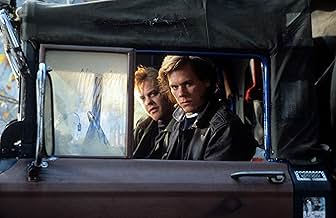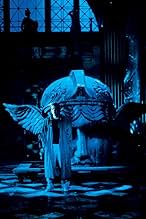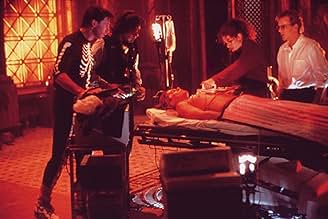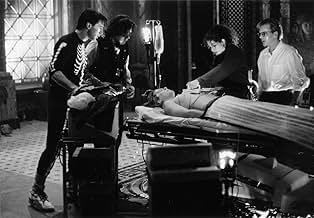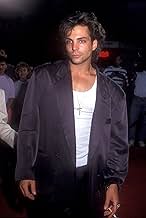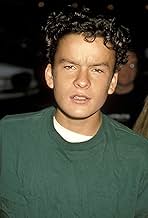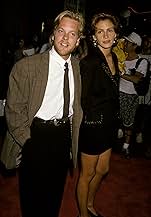Vier Medizinstudenten experimentieren mit "Nahtod"-Erfahrungen, bei denen sie mit tragischen Ereignissen aus der Vergangenheit konfrontiert werden, die auf gefährliche Weise beginnen, ihr Le... Alles lesenVier Medizinstudenten experimentieren mit "Nahtod"-Erfahrungen, bei denen sie mit tragischen Ereignissen aus der Vergangenheit konfrontiert werden, die auf gefährliche Weise beginnen, ihr Leben zu beeinflussen.Vier Medizinstudenten experimentieren mit "Nahtod"-Erfahrungen, bei denen sie mit tragischen Ereignissen aus der Vergangenheit konfrontiert werden, die auf gefährliche Weise beginnen, ihr Leben zu beeinflussen.
- Für 1 Oscar nominiert
- 3 Nominierungen insgesamt
John Duda
- Young Labraccio
- (as John Joseph Duda)
Empfohlene Bewertungen
Kiefer Sutherland and Kevin Bacon showcase their talents and give compelling performances, as usual. This might even be one of Bacon's best roles. Unsurprisingly, Julia Roberts was the weakest part of the film, in terms of acting and casting. Oliver Platt proved himself to be a reliably consistent side-character actor, and William Baldwin's performance was decent to mediocre (at least better than Roberts'). The suspense was gripping throughout most of the film, from the "experiment" procedures to the after-math following each one. Overall this film was suspenseful, presented some interesting thoughts and ideas on a controversial subject, and provided some commendable performances. The premise was very provocative here and it was one of the earliest films to show Generation X's ambition despite the suppression by the Baby Boomers. It was also very true to the nihilism that embodies Generation X.
Flatliners has all the ingredients of a good Joel Schumacher film - intelligent, youthful characters, stunning cinematography, a gripping story, and excellent performances. It's escapist fun but it's done very well and resonates with a positive spiritual message despite the unnerving precedings.
Schumacher has a knack for spotting talented young actors, and all of the main five here have gone on to greater things (see the cast list). Their believable performances help to raise this movie well above average. Kiefer Sutherland shines in his egotistical med-student role.
The cinematography really stimulates the right side of the brain, which is what I love about Schumacher; his use of light and location create images that stick. A disturbing nightmarish atmosphere is created which unsettles you while you watch the film and haunts you when you go to bed - reminded me of The Lost Boys.
This is a film that takes an awesome premise - curious students want to find out what's after death, and successfully follows it through into a scary, gripping tale of redemption. One of Schumacher's best; highly recommended.
Schumacher has a knack for spotting talented young actors, and all of the main five here have gone on to greater things (see the cast list). Their believable performances help to raise this movie well above average. Kiefer Sutherland shines in his egotistical med-student role.
The cinematography really stimulates the right side of the brain, which is what I love about Schumacher; his use of light and location create images that stick. A disturbing nightmarish atmosphere is created which unsettles you while you watch the film and haunts you when you go to bed - reminded me of The Lost Boys.
This is a film that takes an awesome premise - curious students want to find out what's after death, and successfully follows it through into a scary, gripping tale of redemption. One of Schumacher's best; highly recommended.
Countless TV displays and the memorable appearances from 4 of today's mega-stars(plus Hope Davis's screen debut) keep Flatliners still in prudence. The plot is about a non-academic research of five medicine undergrads pursuing one's crazy idea on discovering the secret of death, and learn what's after death, then come back to life again. Yet the storyline hasn't been designed as fascinating as the idea of the plot.
There are popular stereotypes to develop a regular teen-slasher script in Flatliners. There is Nelson who creates the idea of decoding death, pretty but introverted Rachel, David who cuts the Gordian knot on luckily not to be dismissed from the school, ladies' man Joe and finally the smart guy Randy("I did not come to medical school to murder my class mates no matter how deranged they might be"). They join hands altogether in an experiment where Nelson's heart will be stopped and rerythmed. Then they decide to continue this experiment in strict confidence at night times in the campus. Not long after Nelson's experience everyone starts a race over having the wildest and the longest death experience, risking their lives one by one. Yet, soon they realize their daily life becomes affected from those experiences they had. The visits to the afterlife brings back their delinquent feelings from their childhood memories. Depolarizing their deep subconscious watchfulness, they begin having somatic delusions and visual hallucinations.
When the point comes where the explanation of subconscious, director Joel Schumacher skips that every humankind has a subconscious personality which they are not aware of. This inner personality keeps one from altering into identity loss. If you lose or if you depolarize this subconscious personality you certainly lose your identity instead of refreshing childhood memories. I wanted to add this as a movie mistake, which already has been mentioned via movie critics in the earlier 90s'. Obviously here in this movie Schumacher made the actors have it least affected. Then why do they hesitate continuing on the experiment after learning their lesson, as if death is designed indiscoverable by God? David had been introduced as an Atheist, now he turned out to believe in God when he recalled a flashback from his childhood. After witnessing this 180 degreed change in David, it's clear to see that Schumacher's film was so conservative and lily-livered; that's ultimately why it's never classified as a work of science fiction. Alas! It had a good potential. It even tried to tell the unconscious maturation from having a death experience, beginning to believe that death is so simply natural and it's only a part of a human's life.
More than what's in the movie, it was also memorable to recall what's with the movie. Jan de Bont as the cinematographer, who had worked almost every time with Schumacher, creates an dreamy atmosphere like it's being an Gothic horror movie. The blue color schemes all over the walls reflecting into the actors' faces deliver first class of lighting, that suits perfectly with the film. The close-up shots of the gargoyle statues in the campus buildings, Catholic frescoes in the walls, stop-motion cameras, and the dynamic camera speeds were all belong to Bont's skills.
Flatliners became a cult movie in time with its sociological pen-portrait of the X-generation juvenile especially via its futuristic editing style with storyboard connection sequences like being part of a video music clip so much aesthetically. Those were the times where fast-paced and multi-sequenced video music clips were on rise. This style was very rare to come across in those years after its pioneer Tony Scott's "The Hunger(1983)".
There are popular stereotypes to develop a regular teen-slasher script in Flatliners. There is Nelson who creates the idea of decoding death, pretty but introverted Rachel, David who cuts the Gordian knot on luckily not to be dismissed from the school, ladies' man Joe and finally the smart guy Randy("I did not come to medical school to murder my class mates no matter how deranged they might be"). They join hands altogether in an experiment where Nelson's heart will be stopped and rerythmed. Then they decide to continue this experiment in strict confidence at night times in the campus. Not long after Nelson's experience everyone starts a race over having the wildest and the longest death experience, risking their lives one by one. Yet, soon they realize their daily life becomes affected from those experiences they had. The visits to the afterlife brings back their delinquent feelings from their childhood memories. Depolarizing their deep subconscious watchfulness, they begin having somatic delusions and visual hallucinations.
When the point comes where the explanation of subconscious, director Joel Schumacher skips that every humankind has a subconscious personality which they are not aware of. This inner personality keeps one from altering into identity loss. If you lose or if you depolarize this subconscious personality you certainly lose your identity instead of refreshing childhood memories. I wanted to add this as a movie mistake, which already has been mentioned via movie critics in the earlier 90s'. Obviously here in this movie Schumacher made the actors have it least affected. Then why do they hesitate continuing on the experiment after learning their lesson, as if death is designed indiscoverable by God? David had been introduced as an Atheist, now he turned out to believe in God when he recalled a flashback from his childhood. After witnessing this 180 degreed change in David, it's clear to see that Schumacher's film was so conservative and lily-livered; that's ultimately why it's never classified as a work of science fiction. Alas! It had a good potential. It even tried to tell the unconscious maturation from having a death experience, beginning to believe that death is so simply natural and it's only a part of a human's life.
More than what's in the movie, it was also memorable to recall what's with the movie. Jan de Bont as the cinematographer, who had worked almost every time with Schumacher, creates an dreamy atmosphere like it's being an Gothic horror movie. The blue color schemes all over the walls reflecting into the actors' faces deliver first class of lighting, that suits perfectly with the film. The close-up shots of the gargoyle statues in the campus buildings, Catholic frescoes in the walls, stop-motion cameras, and the dynamic camera speeds were all belong to Bont's skills.
Flatliners became a cult movie in time with its sociological pen-portrait of the X-generation juvenile especially via its futuristic editing style with storyboard connection sequences like being part of a video music clip so much aesthetically. Those were the times where fast-paced and multi-sequenced video music clips were on rise. This style was very rare to come across in those years after its pioneer Tony Scott's "The Hunger(1983)".
Hmmm.... Since I love Kiefer Sutherland so much, my review might be a little biased. He was, however, pretty good in Flatliners. A wonderful idea for a movie, and a great gothic-type thriller. Sutherland's guilt and fright at the return of boy he taunted terribly when he was young (I'll try not to give away the rest) seemed genuine, especially since he seems drawn more often than not to act characters that are a**holes (there was really no other way to put it). As a young medical school student, his research into life after death draws his friends into dangerous situations and a great finale. The medical school did seem a little sub-standard, though, I will admit. Kevin Bacon is great in Flatliners, as is one of my favorite sarcastic actors, Oliver Platt. William Baldwin's also a cutie and did okay, and though I'm not a Julia Roberts fan, so did she. The plot will draw you in and keep you on the edge of your seat, and there's an interesting dark atmosphere pervaded by a lot of red and blue for emotional impact. A good movie.. I'd give it at least an 8 out of 10
I recall seeing this movie three times, first in the early 90s, then 00s and now I just saw it again and each time I've grown more fond of it. There is something in Schumachers style that drags me into it. The story is OK, nothing really remarkable. It's one part ghost story, one part medical thriller, one part love triangle.
What really makes this movie worthwhile is Schumachers direction. He's got a very good eye for this Gothic style. One might wonder why the school was so poorly lit, or what exactly was the place they did their experiments at, but it's all for the mood, it's all style. Sometimes style does go over substance, but in this case they work hand in hand. The Gothic architecture and gloomy late autumnal Chicago are just what this movie needed. Just like The Lost Boys IS small town sunny California. Schumacher should've stuck to this style which clearly is his forte, but sadly he has since had a very varying career with only occasional hits.
The cast is great, all of the stars have gone a long way since. Makes one only wonder what could've become of William Baldwin had he made better career moves. He is very good in this movie. I've always liked Kiefer Sutherland as a movie actor, and he does a remarkable job here too. I really would've rather seen him as a full time movie actor rather than going for TV.
There is only one thing that bothers me in this movie and it's the story in all it's simplicity. If people have had near death experiences before and have come back to tell, what new did this crew try to achieve? If not only have personal experience of death, but I got the idea most of them were in it for the science. Why risk brain damage and gamble with life for something you will not get any proof anyway. Especially given that they are medical students, the story is not 100 % believable, but like I stated earlier, watch this movie more for the mood.
I'm glad it's already been so long since the 90s so one can start appreciate the movies of this decade again without getting caught on the hairdos and such.
What really makes this movie worthwhile is Schumachers direction. He's got a very good eye for this Gothic style. One might wonder why the school was so poorly lit, or what exactly was the place they did their experiments at, but it's all for the mood, it's all style. Sometimes style does go over substance, but in this case they work hand in hand. The Gothic architecture and gloomy late autumnal Chicago are just what this movie needed. Just like The Lost Boys IS small town sunny California. Schumacher should've stuck to this style which clearly is his forte, but sadly he has since had a very varying career with only occasional hits.
The cast is great, all of the stars have gone a long way since. Makes one only wonder what could've become of William Baldwin had he made better career moves. He is very good in this movie. I've always liked Kiefer Sutherland as a movie actor, and he does a remarkable job here too. I really would've rather seen him as a full time movie actor rather than going for TV.
There is only one thing that bothers me in this movie and it's the story in all it's simplicity. If people have had near death experiences before and have come back to tell, what new did this crew try to achieve? If not only have personal experience of death, but I got the idea most of them were in it for the science. Why risk brain damage and gamble with life for something you will not get any proof anyway. Especially given that they are medical students, the story is not 100 % believable, but like I stated earlier, watch this movie more for the mood.
I'm glad it's already been so long since the 90s so one can start appreciate the movies of this decade again without getting caught on the hairdos and such.
Wusstest du schon
- WissenswertesDuring pre-production, the actors worked with medical technical advisor Ruth F. Ekholm, who tutored them on the proper medical procedures for the scenes in which the students flatline on the EKG and EEG machines, signaling cardiac and brain death, respectively. They also took advantage of Peter Filardi's research of published accounts from people who'd had near-death experiences. Almost all accident victims reported a tunnel leading to a beautiful white light and friendly voices. People who had attempted suicide had troubled, emotionally painful near-death experiences.
- PatzerWhile a defibrillator is of no use if a patient has truly flatlined, a patient in a "fine v-fib" rhythm can appear to have flatlined but still be revived with the paddles. Therefore, when in doubt, the Advanced Cardiac Life Support guidelines call for administering the shock, though it's not the treatment of choice.
- Zitate
[first lines]
Nelson Wright: Today is a good day to die.
- SoundtracksPARTY TOWN
Written and Performed by David A. Stewart (as Dave Stewart)
Courtesy of BMG Records (UK) Ltd.
Top-Auswahl
Melde dich zum Bewerten an und greife auf die Watchlist für personalisierte Empfehlungen zu.
Details
- Erscheinungsdatum
- Herkunftsland
- Sprache
- Auch bekannt als
- Línea mortal
- Drehorte
- Museum of Science & Industry - 57th & Lake Shore Drive, Jackson Park, Hyde Park, Chicago, Illinois, USA(exteriors: Tait Building)
- Produktionsfirmen
- Weitere beteiligte Unternehmen bei IMDbPro anzeigen
Box Office
- Budget
- 26.000.000 $ (geschätzt)
- Bruttoertrag in den USA und Kanada
- 61.489.265 $
- Eröffnungswochenende in den USA und in Kanada
- 10.034.685 $
- 12. Aug. 1990
- Weltweiter Bruttoertrag
- 61.489.638 $
- Laufzeit1 Stunde 55 Minuten
- Farbe
- Sound-Mix
- Seitenverhältnis
- 2.39 : 1
Zu dieser Seite beitragen
Bearbeitung vorschlagen oder fehlenden Inhalt hinzufügen



